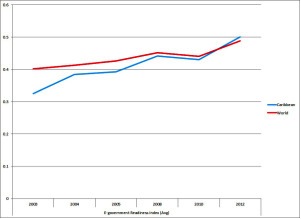“E-governance is the public sector’s use of information and communication technologies with the aim of improving information and service delivery, encouraging citizen participation in the decision-making process and making government more accountable, transparent and effective. E-governance involves new styles of leadership, new ways of debating and deciding policy and investment, new ways of accessing education, new ways of listening to citizens and new ways of organizing and delivering information and services. E-governance is generally considered as a wider concept than e-government, since it can bring about a change in the way citizens relate to governments and to each other. E-governance can bring forth new concepts of citizenship, both in terms of citizen needs and responsibilities. Its objective is to engage, enable and empower the citizen.”
UNESCO
Following the definition above, one can see where e-governance could improve efficient delivery of government services, boost democracy and improve our governments’ image. But for an e-governance project to be successful, it requires immense support from our governments; i.e. they must make every effort to establish regular use of the service by fulfilling all of its functions, as well as encouraging its use by the public. Since this can be a relatively costly effort, it requires strategic planning and a committed government.
“In Korea, which won the UN’s global e-governance 2010 and 2011 awards, citizens can petition government, complain about government services, pay their taxes and apply for patents online. Businesses can get goods through customs quickly at a lower cost and find all information they need on a single online space” [¹]. By offering the complete process for government services online, the public will be able to access these services 24/7, reducing the bottleneck at tax departments and other such government departments. Aside from the apparent enhancement in efficiency, this move would ease the pressure on the staff at these departments and allow them to spend more time serving the needs of customers who have to come into the physical office. Additionally, it will encourage more citizens to make the effort in paying their dues (tax, bills, etc.), and allow them to be productive with time (travelling and standing in line) they have saved. E-governance could also facilitate a deeper relationship between our governments and the electorates beyond the election season. This e-service has the potential to:
- boost interaction between both parties, by providing a more convenient method for requesting government service (especially in time of disaster);
- supply/provide information to public using a far-reaching, 24/7 channel; and
- make the electorates feel more involved and important, by offering them 24/7 access to their government.
By making the electorate more involved and supplying them with news and information on policies and other government undertakings, there will be greater accountability on our governments’ part–transparency and public confidence will gradually increase. This can also improve our governments’ image in the international arena, increasing our potential for investment and doing business. E-governance could also serve as the gateway for other e-services: our governments’ efforts to support e-governance would fuel the need to make ICTs more widely available to all, and would encourage a spirit of e-service usage (citizens would become used to the idea of using e-services to carry-out tasks, which would make introducing and promoting new e-services smoother).
Since its creation in 2003, the United Nations Public Administration Programme (UNPAP) has released a number of publications on e-government development around the world, with a ranking of each nation using an E-Government Readiness Index (EGDI). The EGDI is a “composite measure of the capacity and willingness of countries to use e-government for ICT-led development” which “… looks at the most important dimensions of e-government: (i) scope and quality of online services, (ii) telecommunication connectivity, and (iii) human capacity”. Also taken into account are each country’s infrastructure availability, size, ICT penetration, and the level of education [²]. The results (see the line graph below) show that the region has seen remarkable growth when comparing its average EDGI for 2003 to that for 2012, as we are now above the world’s average, but still a long way from the world leader, the Republic of Korea with an EGDI of 0.9283.

The low value for 2013 is not solely due to poor e-readiness, as nine (9) of the fifteen Caribbean nations had an EGDI above the world average in that year – the low EDGI is attributed to the lack of online presence of Dominica and Suriname (2003), and Haiti (2003 – 2005). Barbados has been the region’s leader since 2008, and along with Antigua and Barbuda, has seen the greatest growth in the region – the former moving from a world rank of 76 in 2003 to 44 in 2012, and the latter moving from 92 in 2003 to 49 in 2012. “The national site of Barbados offered a user friendly approach of “channels” such as the Government Channel, Citizens & Residents Channel, Businesses Channel, etc., making it easier for the user to find relevant information. Moving towards transactional offerings, it allowed for calculation of land taxes. Improvements in online offerings along with investments in telecommunications and human capital allowed Antigua and Barbuda to advance to a world ranking of 49th in 2012. Similarly, in Dominica and in Grenada, substantial investments in access infrastructure, especially broadband, contributed to an advance in world rankings.” [³].
Although the region has seen a satisfactory progress in our e-readiness for e-governance, the bulk of our e-governance efforts have been in the form of debates and public administration reformation efforts for far too long. There are many other services that can to be digitized, so that our progress can be felt across the public and private sector. Social inclusion, transparency and e-democracy are other areas that need to be tackled. More action on the part of our governments is essential to see this e-service come to life – an abundance of potential continues to await the region!








Ralph Birkhoff
An excellent follow up article Venesa.
With all due respect to Mr. Perry, we should be well beyond having to prove that e-government services benefit society, business, and economic development. There is a reason why developed countries moved to online government services decades before the Caribbean region – simple tasks (ie. license renewals, tax returns, application processes) get done quickly and efficiently, and without a need to drive to some government office (often multiple times) and stand in line with pen and paper, which is still standard procedure in the Caribbean.
Effective e-services, if done properly, are designed with the end user in mind. Application instructions are inclusive and comprehensive (you will not be asked for anything other than the original information requested), approval processes and results are transparent, timelines are clearly outlined and are met, and there is always a high level of personal information security.
The focus should now be on implementation, and as quickly as possible. Current government service levels in the region are probably 30 years behind the developed world. What takes me 2 minutes to do online in Canada, takes me at least 3 days to obtain in Saint Lucia. Imagine how much more productive everyone could be without these delays?
But to implement means change, and part of that change is the reduction of government administrative staff. With e-services comes streamlining and downsizing (or outsourcing) of government staff, and therein lies the real issue. Governments here are projected as job creation units, and until the economy improves, and investment in new businesses escalates, it is political suicide to cut government jobs.
In my opinion, there is also a fear of transparency in government processes. Let’s be honest, Caribbean governments in general are not known for transparency, and we all know that many government leaders use their position to their own personal economic benefit. As Vanesa rightly points out, e-services could elevate the governments’ ability to raise transparency levels to international standards. Procurement services, for one, would benefit significantly. But officials currently in those roles should be concerned if a public procurement system like MERX (www.merx.com) was implemented. It would clearly illustrate how ineffective (or even illegal) these officials had been in the past.
So as per Mr. Dujon’s recent article on Chronic Underdevelopment, how do we overcome these hurdles?
If we are not moving forward, we are moving backwards.
Venesa Watson
Hi Mr. Birkhoff. I whole-heartedly agree with you on all your points except with the job-losses. There will be certain areas where a down-sizing will be necessary, but the affected employees can be trained and used to provide on-line and telephone support/customer service to aid citizens using the e-services. Staff will also be required for the processing of the e-transactions – as such, job losses may not be a consequence of e-governance.
With regards to the “fears” of our Government, I remember reading an article where the author expressed that his belief is that Members of Parliament view e-governance as “extra” work. In that, being transparent and interacting with citizens through e-portals is seen as too much more work in addition to what their “regular duties”. I do believe this is true – if they do not see e-governance as beneficial as opposed to “extra work”, then they will continue at a snail’s pace with regards to developing a better e-governance network.
Even though e-governance starts with the government, it is up to the citizens really to push for more to be done – like what Mr. Perry says, we need to demonstrate why ICTs [and e-services] are important. If you look at this: http://onlinempa.unc.edu/a-citizens-guide-to-open-government-e-government-and-government-2-0/ – it’s a compilation of tools, organizations, blogs, etc. started by citizens in their quest for open-governments/e-government. This is definitely something that we (Caribbean citizens) can use to demonstrate the importance of and our need for open-governments, etc.
Keston Perry
Thank you for a very informative article. It nevertheless remains hypothetical and lacks empiricism with respect to actual projects that have been ongoing and their impacts. Though macro-level indicators give you an idea, they don’t tell you what organisations are actually doing and what progress has been made in particular areas, and the actual impact on the citizens. If you are familiar with the ICTs for development debate, then all that has been said in this article has been said in different ways in different policy circles from the UN ICT Task force and many other national efforts undertaken by governments in the region.
There is also come cynicism that still is pervasive in the region among scholars like Gale Rigobert and Norman Girvan on this question of ICTs for development. But more recent work by Gillian Marcelle (2004) on ICTs for development and Dhanaraj Thankur (2012) gives some indication of the potential of ICTs. I also came across a very recent journal article published this year on the productivity gains of ICTs in developing countries, if one required more evidence:
Dedrick, J., Kraemer, K.L. and Shih, E. (2013) ‘Information Technology and Productivity in Developed and Developing Countries’, Journal of Management Information Systems, 30(1), pp. 97-122.
I think we have to start to demonstrate why ICTs is important beyond the rhetoric. Many government departments have implemented ICT projects but so much emphasis is placed on the technical side and the infrastructure, little is done on the people side who use or implement the systems. An over-dependence on the system to correct all the deficiencies is just as bad or even worse than if there were no ICT infrastructure at all, when the people systems have not been aligned or appropriated shifted to allow for such gains to be made from these tools.
Jon Dujon
Thank you for your interest in this article. First, I would like to point out that this is the 3rd instalment in the e-development series – the answers for some of your questions may be in these previous posts (also, I would love to hear you views on them as well). In this article, and other papers that you referred to, marco-level indicators are used to give an idea of the potential benefits of e-governance. But there are small-scale case studies that have shown how citizens have benefitted from e-governance in their nation. For example, the government of Brazil has an e-Participation system called “Fale com Deputado”/”Talk to the MP” that is used by the citizens to interact with their Member of Parliament through chat rooms, discussion forums. Brazil’s e-governance network has been described as an “example on how the governments can better interact with citizens and companies, improve the efficiency of internal management, cut costs and provide information and public services in a much more organized platform.” For Canada, their e-Government initiative have led to enormous cost-savings – “in-person transaction costs on average about $30 per person and about $10 via telephone, it costs $1 or less per interaction via the Internet. And because the federal government conducts about 400 million transactions each year, the savings add up.” Also, it must be pointed out that there must be a reason why so many countries have and continue to implement e-Government tools – the benefits are endless really, and we are sitting idly to some extent. Caribbean Governments have been criticized for being slow concerning the use of ICTs for development, and you are right to say that we need to demonstrate the benefits of ICTs. To reap the benefits of using ICTs, they need to be integrated in a way that they complement our current system – if done so, we can ensure no total dependence, no job losses, etc. Like the Government of Botswana, our Governments could definitely put more effort into learning from the leaders in e-governance and formulate a strategy (see http://www.gov.bw/Global/MTC/E-gov.Working-Draft%20Strategy.pdf), as well as include the citizens from the planning stage.